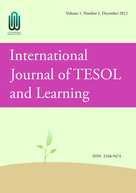


Volume 11 Issues 1-4 (2022-12-31)
Volume 10 Issues 3&4 (2021-12-31)
Volume 10 Issues 1&2 (2021-06-30)
Volume 9 Issues 3&4 (2020-12-31)
Volume 9 Issues 1&2 (2020-06-30)
Volume 7 Issues 3&4 (2018-12-31)
Volume 6 Issues 3&4 (2017-12-31)
Volume 6 Issues 1&2 (2017-06-30)
Volume 5 Issues 1&2 (2016-06-30)
Using an open-ended student survey, this study examined 205 Chinese college students’ perceptions of the flipped classroom strategy used by their professor in teaching the Translation Theory and Practice course at a four-year Chinese university. The following three research questions guided the study: a) what are their overall impression of the flipped classroom strategy? b) What are the important benefits of the flipped classroom strategy? And c) what are their major challenges in attending this flipped classroom? Overall, the participants had a positive evaluation of the flipped classroom strategy. The flipped classroom instruction could provide students with a relaxing, interesting, cooperative, and interactive learning environment. It could take students’ different learning needs into consideration and, therefore, their different learning needs could be met. Chinese college students’ major challenges in attending the flipped classroom were identified. Important educational implications were also discussed.
The purpose of this study was to investigate vocabulary learning strategies (VLSs) of pre-service English language teachers in a foreign language teaching context. The data were collected during Fall 2016 semester from 34 second-year and 54 third-year undergraduate students studying English Language Teaching (ELT) at the College of Education of a state university in Turkey. The instrument used to collect the data was a 5-point Likert-Scale survey adapted by Riankamol (2008) from the Taxonomy of Vocabulary Learning Strategies developed by Schmitt (1997). The main purpose of the study was to identify mostly preferred VLS categories (Cognitive, Memory, Metacognitive, Determination and Social) by second and third year pre-service teachers in ELT programs and to examine if there are any differences between the second and third year pre-service teachers in terms of the specific VLSs they use. Further, semi-structured interviews were also conducted with 20 students to triangulate the quantitative data with the qualitative data on pre-service teachers’ beliefs and attitudes about VLSs. The results indicated some similarities and differences between the two groups of students. Implications highlight the importance of teaching VLSs to pre-service English teachers.